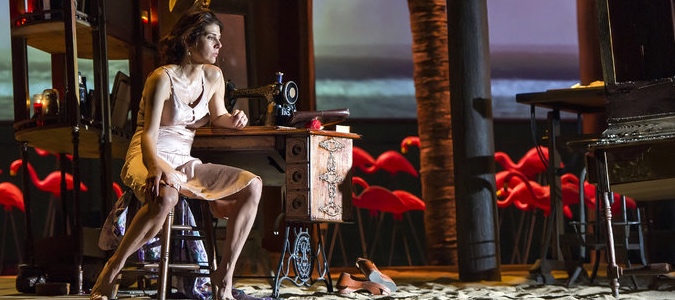

The Rose Tattoo
Opening Night: June 28, 2016
Closing: July 17, 2016
Theater: Williamstown Theatre Festival
Obie Award winner Trip Cullman directs Academy Award winner Marisa Tomei in this new production of Pulitzer Prize winner Tennessee Williams’ intoxicating comedy, which won the Tony Award for Best Play in 1951. After retreating from the world in grief, widow Serafina (Tomei) revives and rejoins the world when the hot-blooded trucker Alvaro arrives at her doorstep. Passion, gossip, music and mystery fill the air in this steamy Gulf Coast town, where possibility and promise ignite.
BUY TICKETSREAD THE REVIEWS:
July 10, 2016
Marisa Tomei, who stars in the Williamstown Theater Festival’s buoyant new production of Tennessee Williams’s “The Rose Tattoo,” may at first blush appear to be literally a few sizes too small for the feisty, fiery central role of Serafina Delle Rose. In describing the character in the text, Williams uses the word “plump” not once, not twice, but three times — and tosses in a “voluptuous” for good measure. He famously wrote the role for the great (and ample-framed) Anna Magnani, who played it in the movie version and won an Oscar for it. But while Ms. Tomei (an Oscar winner herself) may have the svelte figure of a fashion model — dressed in a chic 1950s belted dress in the opening scene, she almost looks like one — inside that slender body is an actor capable of unleashing all the pain and passion that define this lively if not always lovable character. “The Rose Tattoo,” first produced on Broadway in 1951, does not rank among Williams’s most indelible works. It is, at heart, a romantic comedy — a genre we do not usually associate with Williams, the great dramatic poet of heroines damned, doomed or deluded. But while it does not have the penetrating power or the tenderness of feeling of his great dramas, it retains an indisputable lively charm, and in Serafina, whose worshipful adoration of her husband almost destroys her, Williams created yet another memorable portrait of a woman in extremis. The new production, inventively directed by Trip Cullman, trims the text (wisely), eliminating a few minor characters. (It also adds a few snatches of Italian song, nicely performed by Lindsay Mendez, in keeping with the play’s almost musical textures.) The play is set in and around Serafina’s humble home, where she makes a living as a seamstress, helping support her truck driver husband and their daughter, the teenage Rosa (Gus Birney). The Delle Rose ménage is here presented semi-abstractly, without walls and with its jumble of furniture sinking into the sand of the Louisiana Gulf Coast town where the play takes place. The set designer Mark Wendland has provided a striking video backdrop (the projections are by Lucy Mackinnon) depicting waves lapping at the shore — initially a little distracting, but in keeping with the play’s theme of time and life ticking away as Serafina withdraws from the world after her (unseen) husband, Rosario, is killed in the first act. This calamity all but undoes Serafina. Initially a proudly preening woman, she is called “the baronessa” by her fellow Italian-American locals, semi-mockingly (Barbara Rosenblat excels as a stern but loyal Assunta). Serafina boasts almost obsessively about her sexually fulfilling marriage, and after his death enters a cave of deep mourning from which she has no desire to emerge. Three years on, she has devolved from a proud matron into a slattern who slouches in and out of her house in a slip, scandalizing the neighborhood. Ms. Tomei marks Serafina’s striking transformation with ease, the radiance fading from her face as Serafina’s ebullient spirit drains away into a bitter rancor that sours even her relationship with her daughter. Darkening her distress even further is the terrified suspicion that the gossip she overheard from a couple of frustrated clients (provided with nice spunk by Medina Senghore and Portia), suggesting that her husband had been unfaithful, may be true. When these doubts steal into Serafina’s heart, we can read them with painful clarity on Ms. Tomei’s confused face. Rosa, played a little too shrilly by Ms. Birney, has recently met a young sailor at a school dance, Jack Hunter (the excellent Will Pullen), and while he’s the picture of young innocence, Rosa scornfully attacks him as a predator. Ms. Tomei’s performance, rich in Italianate color (if, admittedly, lacking the bone-deep realism of Magnani’s), is also sparked with sardonic humor, never more so than in the scene in which she subjects a bewildered Jack to a verbal hiding. When he almost shamefacedly confesses he’s a virgin, she scoffs: “You? A sailor?” And later asks with disgust, “Why do they make them Navy pants so tight?” While the subplot involving Rosa’s ill treatment at the hands of her unhinged mother provides some enlivening humor, it also feels like, well, a subplot. Only when Serafina meets Alvaro Mangiacavallo (Christopher Abbott), like her husband a truck driver, who stumbles into her house one day after an altercation with an oily salesman (Darren Pettie, nicely nasty), does “The Rose Tattoo” gain some emotional traction. Without turning him into an operatic caricature, Mr. Abbott, seen on “Girls” and Off Broadway in Annie Baker’s “John,” among other plays, gives an impassioned and sexually charged performance as the instantly smitten Alvaro, who gradually wears down Serafina’s pious devotion to the memory of her husband. Even when she divines his deception — the rose tattoo he displays was obtained only after he learned about Rosario’s own — Alvaro’s impulsive ardor, and his naked need for a woman to love him as he can love her, melts Serafina’s frozen heart. If you’ve become invested in her suffering, it may melt yours too. “The Rose Tattoo” does not provide any of the anguished catharses of Williams’s celebrated dramas, but there’s something refreshing in the play’s bright colors and Serafina’s amusingly overripe emotional extravagance. It’s not often, after all — strike that: it’s virtually never — that we leave a Tennessee Williams play with a light heart.
READ THE REVIEW


















